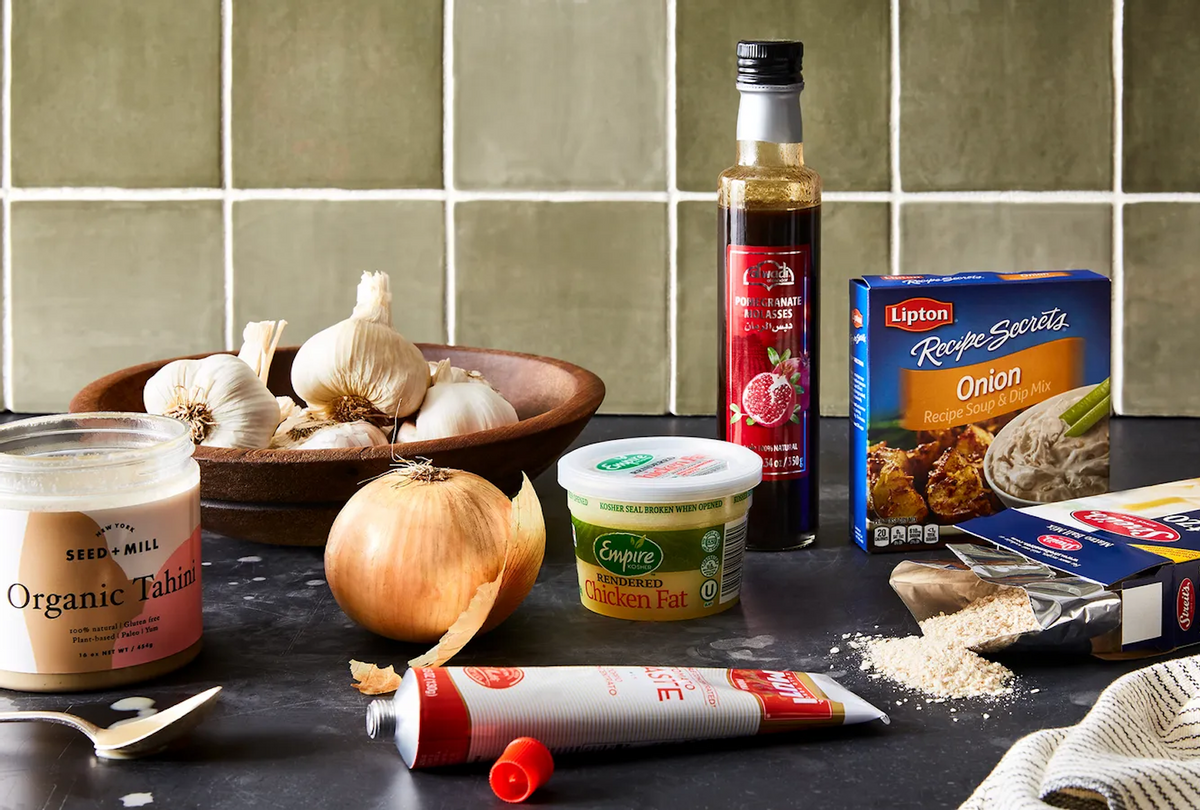I'm a pizza bagel (or a "matzo-rella" stick, depending on your preference), by which I mean I am Italian and Jewish — specifically, Sicilian and Eastern European Ashkenazi — which heavily influences everything I do in the kitchen. Italian- and Jewish-Americans (and especially those of us from New York) have much in common: guilt, family, tradition, and of course, a passion for food.
While no food writer speaks for an entire culture, it's important to note that "Jewish food" in particular is not a monolith. My family hails from Poland and Ukraine, which influences my palate and cooking style. And while many Americans are most familiar with Eastern European-inspired Jewish food, the Jewish people have lived in or been exiled to wide-ranging lands all over the world, including Syria, Tunisia, Lithuania, Yemen, Ethiopia, Uzbekistan, Iraq, Iran, and Mexico — just to name a few. Much as I love matzo ball soup, pastrami sandwiches, and babka, there are so many other uniquely Jewish-American dishes, and stories, to tell.
My own background and the desire to tell the diverse, ever-evolving story of Jewish food inspired me to launch The Nosher in 2011, which is now the largest, most wide-reaching Jewish food site on the internet. Creating a space for Jews of diverse backgrounds to connect to their identity through food spoke deeply to my own experience; and educating a wider audience about the multitude of Jewish culinary traditions is paramount to what we do.
But let's not forget about my incredibly delicious Italian side. My mom taught me to slice up eggplant, salt it lightly and lay it out on brown paper bags to remove the excess moisture before frying for eggplant parmesan, to cook and taste small piece of meatball before the whole lot to make sure they were seasoned properly, to slowly stir the alfredo sauce in order to decadently coat a steaming pile of tortellini. And it definitely wasn't a holiday at my house without a big white box tied with red string full of mixed Italian pastries. My mother's meatball-rolling lessons actually inspired how I roll my matzo balls, a trick which makes them incredibly light and fluffy.
My dual heritage inspires so much of my day-to-day cooking, and I know this is a narrative with which many Americans can relate. Combining our past and where we come from through recipes — and sharing those experiences with our loved ones — simultaneously roots us in our history and inspires new food traditions.
Here are the pantry items I absolutely cannot live without in my kitchen, helping me churn out matzo balls, meatballs, and lots of deliciousness in between.
* * *
My 7 Jewish-Italian-American Pantry Essentials
1. Streit's Matzo Ball Mix
I'll start with matzo ball mix because, for many American Jews, myself included, matzo ball soup is the ultimate comfort food (they don't call it Jewish penicillin for nothing!). It may seem like a controversial choice to use boxed matzo ball mix, as opposed to making it from scratch. But the truth is matzo ball mix, Streit's in particular, is my ultimate secret weapon for making fluffy, flavorful matzo ball soup each and every time. I realize there are quite a few bubbies or savtas who swear that you must whip them up from scratch using matzo meal, chicken fat, and seltzer for them to be truly good, or "real" matzo balls. But I am a firm believer in the magic, ease, and perfection of that little blue box.
2. Tomato Paste
Let's pivot for a second over to the Italian side: I cannot live without tomato paste, especially the kind that you squeeze from a tube. Tomato paste is typically found in cans, but increasingly you can buy it in tube form, which means you can use just a little, screw on the lid like toothpaste, and put it back in the refrigerator without opening an entire can then forgetting about it for months only to find it growing mold. (Not that I've ever let a can go to waste.) Tomato paste goes in everything in my house: stew, brisket, tomato sauce, shakshuka, and sauteed veggies — to name just a few.
This little packet of salty goodness is tried and true for good reason: It's versatile, and it makes things taste great (there's soy sauce, sugar, and onion powder among the salty and sweet seasonings inside a packet!). Sure, use onion soup mix (I like Lipton!) how it was intended: make it into a dip to nestle alongside some veggies and ridged potato chips. But in my kitchen, it most frequently gets added to stews, brisket, and roast potatoes, which the box has printed right on the back.
4. King Arthur Bread Flour
I bake challah weekly for our Friday night family dinners. Pre-COVID, this was sometimes a more formal Shabbat dinner, with other guests and a larger meal. These days, it's just my family of five. There are rituals and songs, but it's a bit more casual. Still, there will be challah, and I just cannot live without good quality, high-gluten flour, specifically King Arthur (which I used exclusively when testing recipes for my first cookbook, Modern Jewish Baker). Whether you are a sourdough baker, focaccia lover, or challah aficionado like me, it's a fantastic, top-tier quality flour to have on hand.
5. Seed and Mill Tahini
Another specific ingredient I cannot live without is Seed And Mill's tahini. Their product is superior to many others because of the quality of sesame seeds they use, and its freshness. You can even pop into their Manhattan store and get some freshly ground. But if you cannot find Seed And Mill, of course grab whatever tahini you can find, taking care to look for one that is smooth, not chunky, in texture and doesn't have a layer of oil sitting on top, which can indicate that it isn't fresh (this is where it differs from, say, a natural peanut butter). I love making a quick tahini sauce by combining about 1/2 cup tahini with the juice of half a lemon, a good pinch of salt, and around 1/4-1/3 cup cold water, whisking until combined, adding more cold water until it's liquidy enough that it can be drizzled (or thicker if you prefer). Serve with roasted vegetables, grilled lamb, meatballs, or on top of shakshuka.
6. Pomegranate Molasses
Another Middle Eastern ingredient used a lot in Israel and by Sephardi and Mizrahi Jews (but also gaining momentum here in the U.S.) is pomegranate molasses, which is essentially pomegranate juice that is cooked down and reduced to a syrup. It's sweet and tart, just like pomegranate, and it imparts a nice punch of brightness. I love drizzling it on top of roasted vegetables (with some tahini sauce too!), adding it to a cocktail, making salad dressing with it or, my favorite use for it, finishing stewed meat dishes like my pomegranate-braised pot roast. You can find it in some grocery stores, Middle Eastern food markets or online.
7. Schmaltz
Last, but far from least, is schmaltz, or chicken fat. Schmaltz could also take the form of rendered duck fat or even goose fat. Rendered fat is a beloved, quintessential ingredient in Jewish cooking, speaking to the frugality that many Jewish people needed when they were poor in Eastern Europe. For Jewish kitchens that are Kosher, it is against the laws of kashrut to combine meat and dairy, meaning you cannot cook a meat-based dish with milk, cheese, or butter. Schmaltz makes an excellent replacement for butter for its fat content and flavor. You can't make matzo balls without melted schmaltz, and it's also fantastic as the fat used in potato kugel or instead of oil in salad dressing . . . and maybe also just drizzled on top of some fresh French fries.
***
Recipe: Pomegranate-Braised Pot Roast
Prep time: 10 minutes
Cook time: 4 hours 35 minutes
Serves: 4 to 6
Ingredients:
- 1 4-pound chuck roast (boneless)
- 2 large yellow onions, roughly chopped
- 3 to 4 medium carrots, peeled and roughly chopped
- 3 to 4 celery ribs, chopped
- 3 garlic cloves, peeled and sliced
- Fine sea salt
- Freshly ground black pepper
- 2 Tbsp neutral oil, such as canola oil, vegetable oil, safflower oil
- 1/4 cup tomato paste
- 1 1-oz packet onion soup mix
- 2 cups chicken stock, beef stock, or water
- 1 cup red wine
- 1/4 cup pomegranate molasses
- Pomegranate arils for garnish (optional)
- Rice pilaf, couscous, or mashed potatoes, for serving
Directions:
- Pat the chuck roast dry with paper towels on all sides. Season all over with salt and pepper.
- Heat the neutral oil in a large Dutch oven or large heavy bottom pot over medium-high heat.
- Sear the chuck roast on all sides until a golden-brown crust forms, around 4 to 5 minutes on each side. Remove from the pan and set aside, and reduce the heat to medium.
- Pour off all but about 2 tablespoons of the rendered fat into a heatproof bowl. When cool, discard.
- Add the onion, carrot, and celery to the same Dutch oven or pot. Sauté over medium heat until softened, around 6 to 7 minutes. Add the garlic and tomato paste and cook for another 2 minutes, until combined.
- Add the stock, red wine, onion soup mix, and pomegranate molasses. Bring to a low boil, and return the chuck roast and all juices to the pot.
- Reduce the heat to low and cover the pot. Cook for 3 to 4 hours, until the meat is completely tender. Check periodically to ensure heat isn't too high, and when the meat is easily shredded, it's done cooking. Season with salt to taste.
- Remove the meat from the pot and place on a cutting board. Break apart the meat into pieces (I like roughly 4-ounce pieces, but you can go larger or smaller depending on your preference) and transfer to a serving platter. Spoon the sauce over the meat. Serve alongside rice pilaf, couscous or mashed potatoes.
This post contains products independently chosen (and loved) by Food52 editors and writers. As an Amazon Associate and Skimlinks affiliate, Food52 earns an affiliate commission on qualifying purchases of the products we link to.




Shares